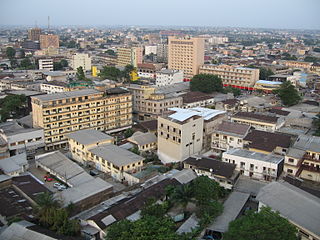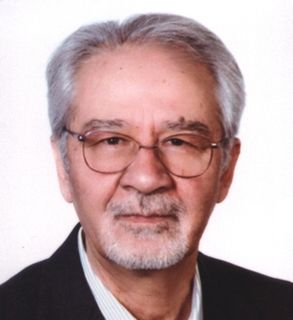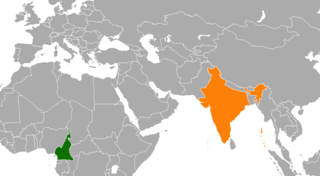Related Research Articles

Cameroon, officially the Republic of Cameroon, is a country in west-central Africa. It is bordered by Nigeria to the west and north; Chad to the northeast; the Central African Republic to the east; and Equatorial Guinea, Gabon and the Republic of the Congo to the south. Its coastline lies on the Bight of Biafra, part of the Gulf of Guinea and the Atlantic Ocean. The country is sometimes identified as West African and other times as Central African, due to its strategic position at the crossroads between West and Central Africa. Its nearly 25 million people speak 250 native languages.

The economy of Cameroon was one of the most prosperous in Africa for a quarter of a century after independence. The drop in commodity prices for its principal exports – petroleum, cocoa, coffee, and cotton – in the mid-1980s, combined with an overvalued currency and economic mismanagement, led to a decade-long recession. Real per capita GDP fell by more than 60% from 1986 to 1994. The current account and fiscal deficits widened, and foreign debt grew. Yet because of its oil reserves and favorable agricultural conditions, Cameroon still has one of the best-endowed primary commodity economies in sub-Saharan Africa.

Yaoundé is the capital of Cameroon and, with a population of more than 2.8 million, the second-largest city in the country after the port city Douala. It lies in the Centre Region of the nation at an elevation of about 750 metres (2,500 ft) above sea level.

A chamber of commerce, or board of trade, is a form of business network, for example, a local organization of businesses whose goal is to further the interests of businesses. Business owners in towns and cities form these local societies to advocate on behalf of the business community. Local businesses are members, and they elect a board of directors or executive council to set policy for the chamber. The board or council then hires a President, CEO, or Executive Director, plus staffing appropriate to size, to run the organization.

Ambazonia, officially the Federal Republic of Ambazonia, also referred to as Amba Land, is a self-declared state in West Africa constituting the Northwest Region and Southwest Region of Cameroon. No country has formally recognized Ambazonia's independence, and it is currently the site of an armed conflict between Ambazonian separatists and the Cameroonian military known as the Anglophone Crisis. Ambazonia is located in the west of Cameroon and southeast of Nigeria on the Gulf of Guinea.

Cameroon is a Central African nation on the Gulf of Guinea. Bantu speakers were among the first groups to settle Cameroon, followed by the Muslim Fulani until German domination in 1884. After World War I, the French took over 80% of the area, and the British 20%. After World War II, self-government was granted, and in 1972, a unitary republic was formed out of East and West Cameroon. Until 1976 there were two separate education systems, French and English, which did not merge seamlessly. French is now considered the primary language of instruction. Local languages are generally not taught as there are too many, and choosing between them would raise further issues.

Jing Ulrich, née Li (李晶), is the managing director and vice chairman of global banking and Asia Pacific at JPMorgan Chase. She provides strategic advice to the firm’s most senior clients across all sectors and asset classes, including advisory and capital raising for transformative companies in the technology, mobility, healthcare, and consumer markets. Educated at Harvard and Stanford universities, Ulrich helps foster greater cross-border collaboration, building relationships with executives from Asia's leading enterprises, private equity and sovereign wealth funds, and prominent multinationals.

The following outline is provided as an overview of and topical guide to Cameroon:

Douala is the largest city in Cameroon and its economic capital. It is also the capital of Cameroon's Littoral Region. Home to Central Africa's largest port and its major international airport, Douala International Airport (DLA), it is the commercial and economic capital of Cameroon and the entire CEMAC region comprising Gabon, Congo, Chad, Equatorial Guinea, Central African Republic and Cameroon. Consequently, it handles most of the country's major exports, such as oil, cocoa and coffee, timber, metals and fruits. As from 2018, the city and its surrounding area had an estimated population of 2,768,400. The city sits on the estuary of Wouri River and its climate is tropical.
There were estimated to be more than two thousand Chinese people in Cameroon as of 2008.
The mass media in Cameroon includes independent outlets. The nation has only one national newspaper, which is state owned.

China and Cameroon established bilateral relations on March 26, 1971. Cameroon is an adherent to the One China Policy.
Cameroonian American are an ethnic group of Americans of Cameroonians descent. According to the census of 2010, in the United States there were 16,894 Americans of Cameroonian origin. According to the 2007-2011 American Community Survey there are 33,181 Cameroonian-born people living in the United States.

Mohammad Mehdi Behkish is an Iranian Economist and retired Associate professor at the Allameh Tabatabaei University of Tehran. He served as president of the Iran-Italy Chamber of Commerce for more than 21 years (1992-2013), and is currently president of the Presidency Council.

Since independence, corruption has been more than prevalent in Cameroon. In fact, corruption has become pervasive and has affected all sectors of the government and civil society including the executive, judiciary, police, and even the private sector. The main causes being a deep lack of political will to fight corruption and neopatrimonialism. Other causes include; personal interests & absence of duty conscience, weak judiciary & almost nonexistent opposition in the legislative, nepotism & favouritism, ineffective system of accountability, among others.
The Cameroonian American Chamber of Commerce (CAMAM) is an NGO founded in 2014 with the aim of advocating for private sector development in Cameroon by promoting the active engagement of the diaspora in the United States, as well as generating awareness about investment opportunities in Cameroon. Its offices are based in Washington, D.C.

Cameroon–India relations refers to the international relations that exist between Cameroon and India. The High Commission of India in Abuja, Nigeria is concurrently accredited to Cameroon. India also maintains an Honorary Consulate in Douala. Cameroon has no diplomatic mission in India.
The Ambazonian leadership crisis is an ongoing internal conflict within the Interim Government of Ambazonia. The crisis started on May 2, 2019, when a document signed by the first president of Ambazonia, Sisiku Julius Ayuk Tabe, acting from detention in Yaounde and in contact with Cameroon interior ministry officials, declared the dissolution of the cabinet of interim president Samuel Ikome Sako and restored its predecessor led by Ayuk himself. The move surprisingly sidelined the outcome of the election of interim president Sako in an expanded electoral college on 4 February 2018, combining the predecessor cabinet, country and regional representatives of Ambazonia.

Somaliland and the United States do not have official diplomatic relations. While Somaliland operates a representative liaison office in Washington, D.C., it does not have formal diplomatic status under the provisions of the Vienna Convention on Diplomatic Relations. Both countries do maintain contact as delegations from both sides have met in the past.
References
- ↑ "Footballer Profile: Francis Ikome". ForaDeJogo. 1 February 2011. Retrieved 1 February 2014.
- ↑ "Chamber Offers Recipe for Private Sector Development in West Africa". New Telegraph. 4 March 2014. Retrieved 1 July 2014.
- ↑ "US Competes for Better Ties with Africa". China Daily. 4 August 2014. Retrieved 4 August 2014.
- ↑ "Debates: U.S.-Africa Leaders Summit". Africa24. 6 August 2014. Archived from the original on 10 August 2014. Retrieved 5 August 2014.
- ↑ "'Too little, too late,' US tries to catch up". China Daily. 15 August 2014. Retrieved 15 August 2014.